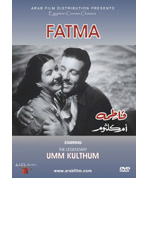
Fatma 2004; original production 1947
Distributed by Arab Film Distribution, 10035 35th Ave. NE, Seattle, WA 98125; 206-322-0882
Producer n/a
Directed by Ahmed Badrakhan
DVD, b&, 126 min.
Sr. High - Adult
Film Studies, Middle Eastern Studies
Date Entered: 05/05/2004
Reviewed by Jane Sloan, Rutgers University LibrariesFatma is a 1940s Egyptian musical on the important and typical theme of a virtuous woman whose purity is threatened by a callow seducer. The Arab diva, Umm Kulthum, (see the 1996 documentary Umm Kulthum: a voice like Egypt, by Michal Goldman from Filmmakers Collaborative) sings nine of her well-known songs at regular intervals in the story, reinforcing the strong emotions provoked by the events.
The eponymous heroine is a revered "doctor" in the neighborhood of "alleys" where she lives and dispenses free treatment to all who ask. She is called to nurse a wealthy crank, and his playboy youngest brother falls in love with her. She demands marriage when offered the status of mistress - "I'd be a passenger without a passport" - and much chicanery and humor accompany the pathos of her struggle to gain respect via a common law document. Much is made of the noisy behavior of the working class, the refined variations on betrayal that mark the upper class, and the strict rules around breeding that criss-cross both. The playboy agrees to live in the neighborhood - surprisingly spacious and clean - while the couple awaits approval from his brother, but he eventually flees, claiming the life there is "killing" him, and leaving her with a child. Fatma is naive, but she is conveniently surrounded by more wily characters who keep the plot going by defending her in court.
The songs provoke some interesting special effects with juxtaposed images illustrating the class themes, though the overall style of the film is classical realism; the acting is generally weak. The digital restoration is good and the DVD includes access to 23 sections within the film, English and French subtitles, and press materials. The film is listed elsewhere as Fatima or Fatmah. Recommended for public or academic libraries with an interest in Egyptian cinema or the popular culture of the Middle East, and also because there are so few examples of this significant regional cinema available.